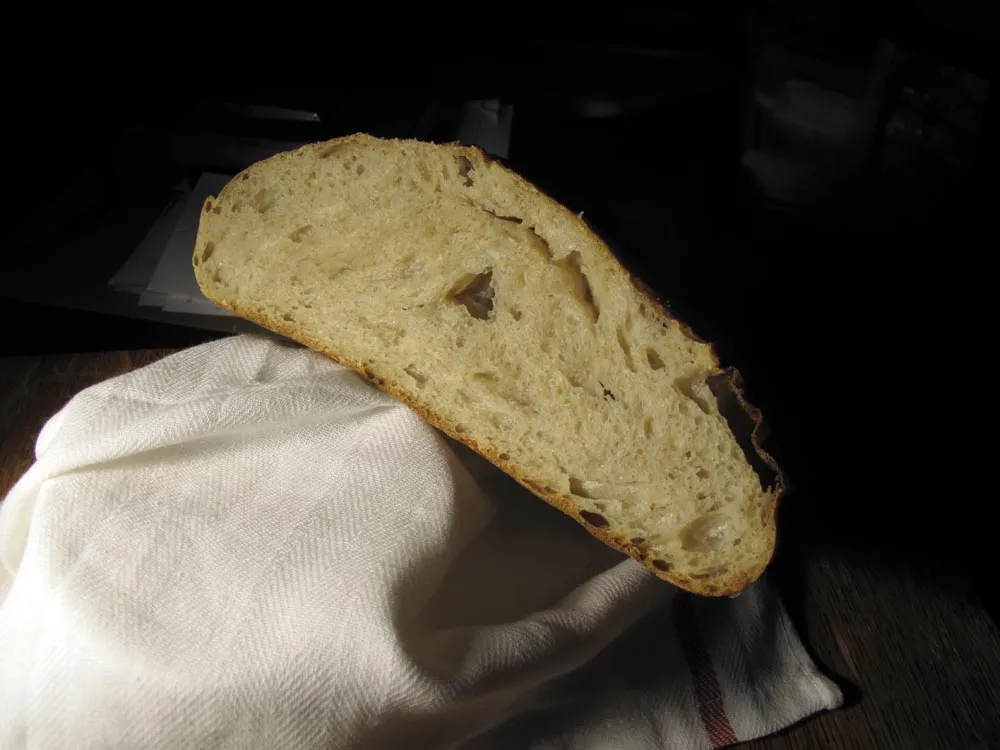
So on my last loaf following the tartine recipe I got my best results yet..big open holes, thick crust and mellow sour flavor. I decided this time around that I wanted to punch up the sour flavor some more so I made my levain about 4 hours earlier than normal (about 7PM) and left it out in a warmer room (about 69F instead instead of 64-65F). I also let this levain mature much longer at that temp too from about 7PM to about 9AM instead of about 10PM to 6AM. The results I got were much much different. I followed the standard Tartine recipe. 200g of levain, 900g of white flour (KA Gallahad) and 100g of KA whole wheat, 20g of salt, 750g of water. In any case my crumb was much denser and my crust was very thin and smooth. In fact my baking time ended up being much shorter too..after the initial 20 minutes covered in my Lodge Combo cooker, the loaf was starting to burn at 15 minutes as opposed to 25 on the previous bake. I was starting to think I was starting to understand a thing or two and then this..the bread tasted great and had the flavor I was looking for, but asthetically it was really weak. I feel like I am still struggling to understand when to guage that bulk fermentation is complete and when I am properly proofed on the second rise. Does this loaf look underproofed? I read somewhere a dense crust with a few large holes could be a sign of underproofing. I have been doing the finger poke, but am still unsure if it is springing back. The video below is the finger poke before loading into the oven (the link is http://youtu.be/gAyMjz8KfMY). Any help on the levain, the bulk fermentation and proofing would be greatly apreciated. Thanks!
Glen
Hey Glen,
Recently had a similar issue. I'm sure some may be a bit more informed as I haven't used the Tartine formula. Eaten the true thing once. Anyway as for levains and starters. There is a lot of effect to how and when to use a sponge or starter. Some have a very precise time to be used, particularly a Rye Sour. On the opposite scope a simple yeasted sponge or poolish has a prime time for use but it has a larger window of hmm dependability.
Recently the weather has changed and is much warmer and our schedule has a levain being ripened overnight for 12 hours which is collapsing at 10 hours and I get a very small dense loaf compared to when the levain is peaked at mixing. I simply have the levain being made 4 hours later and its big and beautiful. Must have to do with maximizing the yeast colony to the final build (final dough) before it begins to die. Now its an 8 hour levain. I could have also decreased the innoculation to keep the times the same. The bread was wondeful with the slightly shorter schedule (the easy change) and so I'm runnin with it.
I think in order for you to extend your levain by 4 hours you'd need to make the same adjustment so it peaks when you are prepared to mix. Another option would be to make your levain and retard it overnight which ripens the levain a bit. I've done this by making the build, leaving at room temp for 4 hours and then 18 hours in retarder and made great loaves.
As for the poke test. With bowl breads I often don't trust the feel of the test on the exposed dough. I usually tilt my banneton a touch and poke the side of the loaf.
By the way it actually looks quite good from here
Josh
Thats not a minor tweak, that's a major change. ;)
If you leave a sourdough loaf for too long (especially outside the fridge), the yeast will start devouring the loaf to the point where you lose integrity; the gluten degrades and the consistency changes. I've had this when I forgot to put a loaf in the fridge before bed, and while I still baked it (it tasted ok), it was far from what I was after.
Thanks for your input guys! That all makes sense..I sometimes feel like I lose track of how all the different factors contribute to the final product. I also reread the more indepth section in the Tartine book too and noticed that with a more acidic loaf like mine that there will be some residual sugars left on the surface of the dough causing the crust to cook much more quickly and also, leading to a denser crumb. My question is this...can you get the super wide open crumb with a more sour tasting loaf?
Thanks again,
Glen
Certainly, although as with most things, you'll get a couple of different answers on how to go about it.
A long cold retard helps, and I my loaves normally spend at least 24 hours in the fridge. I do some of this during the bulk ferment if I need to work it around my schedule, the rest is done when proofed.
Using less starter, which I don't find to make a great difference.
Using a stiff starter, and possibly a bit more of it; I find this to be quite reliable.
Wholemeal flour makes the biggest difference, in my opinion.